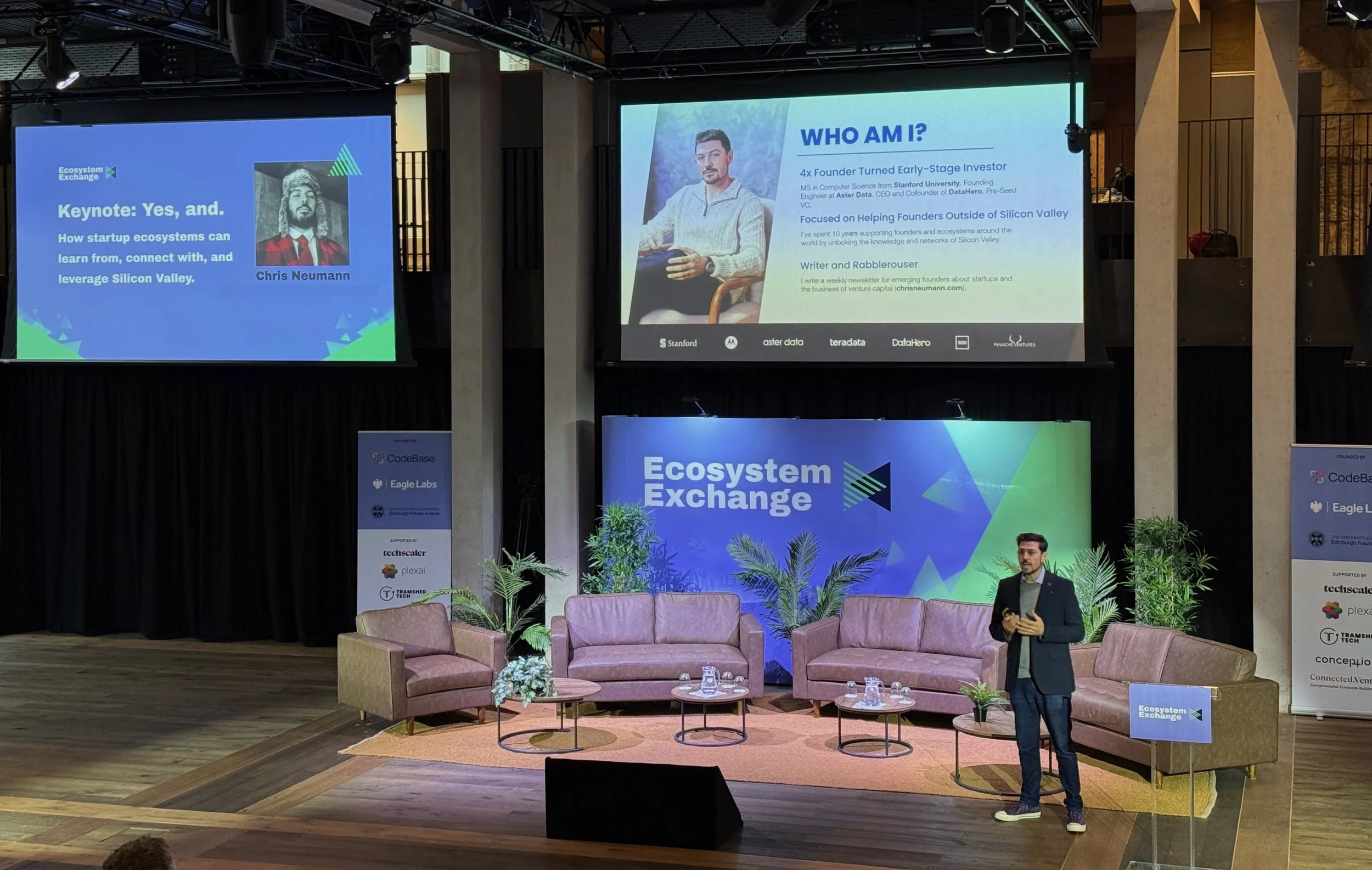Humility vs. Hubris
Last week, I visited Edinburgh, Scotland to speak at Ecosystem Exchange, an annual conference that brings together investors, government officials and ecosystem builders from across UK to collaborate on ways to improve their local, regional and national startup ecosystems.
The conference was the brainchild of Jon Hope, a long-time UK ecosystem builder who previously co-founded one of the country’s largest networks of incubators and co-working spaces, Barclays Eagle Labs.
Over the course of two days, the speakers and panelists dove into a number of issues shared by countries around the world, including:
Disparities in talent, experience and capital availability across different cities and regions
Challenges commercializing IP developed in (government-funded) universities
The tensions between supporting high-growth companies with global ambitions and locally-focused startups that serve domestic needs
The impact of government policies / geopolitical shifts / local culture on startup ecosystems
Challenges retaining top talent and competing globally
When it was my turn to step to the mic, I spoke to the audience about a topic that’s deeply engrained in the ethos of each and every VC around the world: humility.
Ok, so maybe humility isn’t the first word that comes to mind when you think about a venture capitalist.
How about hubris?
It may seem surprising, but a lot of the magic that happens in Startupland™ takes place at the intersection of humility and hubris.
Here are some examples:
The best startup founders possess the hubris to believe that they can create billion-dollar companies out of nothing, but the humility to seek out mentorship, peer advice, and other forms of support to do so.
Top performing VCs possess the hubris to believe that they can identify the most promising startups before anyone else. Their humility comes from the knowledge that nearly 90% of their investments will fail (despite their best efforts). And no matter how much diligence they do, they won’t know which ones until much later.
But what about ecosystems?
In my experience, the ability to navigate hubris vs. humility is essential for ecosystems to grow. Why? Because no ecosystem outside of Silicon Valley has enough density of experience, expertise and talent to do it all.
Smaller ecosystems inherently understand this. One of the reasons why Scotland is amongst the fastest-growing startup ecosystems in the world is because it long-ago embraced the notion that it needs to build connections with other ecosystems in order to augment its domestic capabilities and support its local startups.
Scotland even has a version of its national soda dedicated to startups.
So why did I talk about humility and hubris at an ecosystem conference that took place in a country that seems to have figured it out?
Because even ecosystems that possess the self-awareness to recognize that they have gaps often struggle to maintain humility when addressing them.
Governments spend millions of dollars sending founders around the world to “tap into” other ecosystems (humility), but insist that they participate in highly choreographed programs designed at home (hubris).
Ecosystem builders pour time and effort into creating incubators and accelerators to support their startups (humility), then staff them with people who have no experience actually building successful tech companies (hubris).
Investors obsess over the their portfolio companies raising follow-on rounds from bigger, more prominent (predominantly Silicon Valley-based) VCs (humility) but can’t be bothered to get on a plane to get to know them in order to understand what they are actually looking for (hubris).
(And just to be clear, it’s not only ecosystem supporters who struggle with this tension — founders are far from immune to the pull of hubris.)
We’re currently in an era of significant macroeconomic, technological and geopolitical change. The gap between Silicon Valley and the rest of the world has never been greater. Yet at a time when the U.S. is becoming more insular, tech ecosystems around the world are banding together to address their weaknesses and create economies of scale.
On top of that, I’ve increasingly come to believe that Gen Z may be inherently better at walking the tightrope between humility and hubris than the generations who came before them. Younger founders have a different relationship with community than those who came before them. They also have a different relationship with geography. The Times, They Are A-Changin’.
I’ll close with this thought: as countries continue to shift away from globalization, there is opportunity in building deeper, more consequential relationships between tech ecosystems. Founder-to-founder. Investor-to-investor. Ecosystem-to-ecosystem. The ecosystems that capitalize on these opportunities will be the ones that embrace the idea that economic prosperity >> egos.
And that magic happens at the intersection of humility and hubris.




